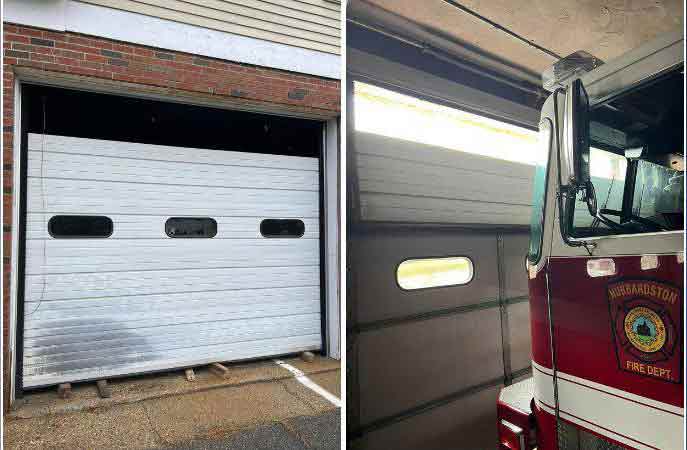Three firefighters from Hubbardston, Massachusetts, are safe after barely escaping serious injury from the garage doors that almost slammed shut on top of them at their station.
Fire officials reported that the incident happened during a power outage that temporarily shut off power to the garage door openers. The power outage caused the heavy doors to fall as the firefighters were trying to leave the station. The firefighters used the manual release to manually raise the garage doors when they slammed shut again, missing the first responders by only inches.

A spokesperson for the Hubbardston Fire Department pointed out that the power outage and broken garage doors were the causes for the station’s delayed response times, which appears to be a recurring issue due to frequent maintenance issues.
What Would Cause a Garage Door to Slam Shut?
There are multiple reasons a garage door can fail and slam shut. Let’s take a closer look at the three most common causes and the signs that will help you prevent such incidents.
1. A Broken Spring
Overhead garage doors are equipped with springs that counterbalance the door’s weight and enable controlled movement. Without the springs a garage door would be extremely heavy to operate, which could cause it to slam shut, just as the firefighters of Station 1 experienced. Common signs of broken springs include:
- Garage door only opens a few inches.
- A loud banging sound coming from the garage.
- An approximate 2” gap separating the spring’s coils.
- The top garage door panel is slightly bent.
- Jerking motion as the garage door opens and closes.
- The garage door struggles to open or close.
2. An Imbalanced Garage Door
An imbalanced condition happens when the springs fail to provide the correct amount of torque to counterbalance the door’s weight or exert too much torque. There are multiple signs that indicate a garage door is not balanced:
- The garage door opener struggles to open or close the door.
- The garage door is taking longer to open and close.
- There are unusual noises during opening or closing.
- The door cables have slack.
- The garage door is opening or closing unevenly.
- The garage door is pulling up or feels too heavy.
3. Broken or Misplaced Cables
The door cables connect the torsion assembly to the garage door itself. If the cables are broken, disconnected, or misplaced, the springs won’t be able to counterbalance the door’s weight. Common signs of broken or misplaced cables include:
- The garage door does not open or close evenly.
- The garage door is off the tracks.
- The garage door struggles to open or close.
How to Prevent Your Garage Door from Slamming Shut or Crashing?
The following steps will help you prevent damage or injuries associated with commercial and residential garage doors.
- Inspect the garage door springs before using the opener’s manual release. If the spring is broken, do not use the manual release.
- Check the torsion assembly for any irregularities. If the cables are broken or disconnected, avoid using the door until the cable is fixed.
- Keep garage doors properly maintained, lubricated, and balanced.
- Use parts and hardware from reputable suppliers.
- Use a licensed garage door repair company for servicing and installing garage doors, springs, openers, and related equipment.
Garage doors can pose hazards to people and their surroundings when not working properly. Periodic maintenance and safety inspections can help mitigate the risks, prevent breakdowns, ensure the safety of the surroundings, and keep the garage door in good repair. Contact a licensed garage door repair company to inspect and evaluate your garage door every 12 months.







